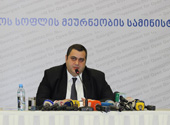
Minister of Agriculture presents summary report
By Tatia Megeneishvili
Tuesday, December 17
Georgia's Agriculture Minister Shalva Pipia estimated 2013 as a revolutionary year for agriculture. The presentation of the annual report was held at Expo-Georgia on December 16. Pipia talked about the projects implemented by the ministry this year.
He called the farmer’s support program as unprecedented.
“The agricultural sector was deemed a priority after the 2012 election, and I can say that this year was revolutionary in this sector,” Pipia said, adding that because of the implemented projects this field is developing very rapidly.
According to the minister, within the frames of the project, 710, 385 beneficiaries received 195.5 million GEL in the form of farming cards. In addition, preferential agro credits were successful for the project, with a budget of 29.6 million GEL. The minister said that under this project, in total, 221 million worth of credit has been issued.
Pipia noted the large-scale rehabilitation of irrigation and drainage canals. This work has provided water to 74.3 thousand hectares of land in Georgia.
The minister also spoke about the export of Georgian products to the Russian market. It was noted that in 2013, 44.6 million bottles of wine were exported to 48 countries, which is 96% higher than in the same period of the previous year.
According to Pipia, the 2013 vintage was also successfully completed. The state, together with the banking sector, offered winery/wine/ grape sector loans for 15 years at only 6%.
According to Pipia, the government allocated an unprecedented sum for citrus as well. Pipia said the state will expense 13, 800, 000 GEL and pay 15 tetri per 1 kg standard tangerine, and 10 tetri for the non-standard fruit. According to Pipia, 23, 000 tons of citrus has been already exported from the country.
Minister of Finance, Nodar Khaduri, said that 2013 was very successful in the agriculture sector. “There were made many changes that gave opportunity to people for development, this is also good for the economy,” Khaduri said, hoping this tendency would continue.

